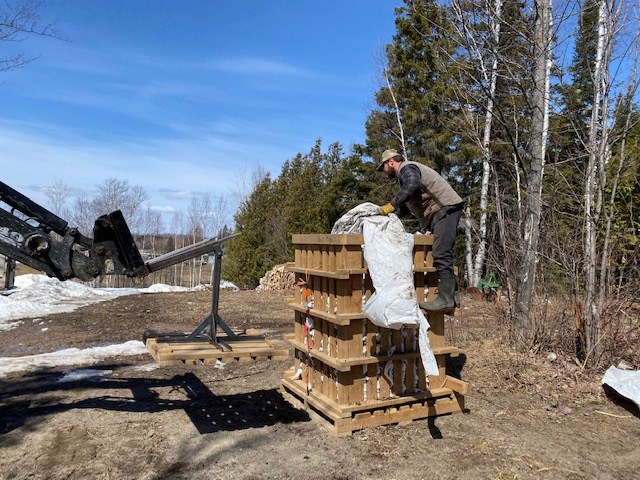There’s good news for Northern Ontario farmers hoping to rid themselves of plastic waste generated on the farm.
A multi-year project that collects haylage film — the white plastic wrap used to preserve hay bales — is back on track, with new funding and a potential new partner that plans to recycle the plastic for other uses.
Led by the Northern Ontario Farm Innovation Alliance (NOFIA), the first phase of the project launched in 2019 as a response to concerns from farmers about what to do with the plastic, which is typically buried, burned or sent to the landfill.
Through the initiative, farmers were to collect their plastic in Ontario-made compactors, and the resulting plastic bales would be collected and sent to an end user for recycling.
SEE: Greening up the ag industry, one hay bale at a time
Though initial funding for the three-year project ran out in 2022, Leia Weaver, NOFIA’s project development advisor, said farmers have continued to use the compactors.
“It's pretty low infrastructure set up to have that compactor box, and it's a very convenient way to take that plastic and [make it] easier for transport, easier for storage,” Weaver said.
“Even if this program wasn't continuing, it's an easy way to manage the plastic on farm, so it's not getting blown around by the wind and getting caught in other machinery and things like that.”
Large-scale farmers can generate thousands of pounds of haylage waste annually, but the plastic, made of linear low-density polyethylene (LLDPE), is difficult to recycle. It’s been a persistent problem in agriculture, which is why NOFIA’s project was welcomed by producers.
As part of the project, NOFIA had secured a partnership with BBL Energy Inc., a Johnstown, Ont., company that pledged to receive the plastic bales, break down the plastic using a process called pyrolysis, and then convert it to energy.
Unfortunately, their demonstration site never materialized, Weaver said, and NOFIA had to switch gears.
“We pivoted to a new end user that was doing more repurposing and creating products instead of fuels during the previous iteration of funding,” said Weaver, noting that the relationship was to continue under the second phase of the project.
“But they were acquired by a group from Texas over the summertime, so just around the time that we were looking to get the next phase going and delivered.”
It was disappointing news for the organization. But NOFIA adapted again, and this time they’re in discussions with a company based on Manitoulin Island that Weaver said “has really good expertise in alternative energies and waste management.”
More research is needed to see how the two organizations can partner together, she said, but “I like the option that we have now. It seems to be a really exciting one.”
New funding provided by the Sustainable Canadian Agricultural Partnership will support this second phase of the project until 2027, and Weaver anticipates releasing a final report on the project in 2028.
SEE: Northern farmers seeking solutions to recycle plastic bale wrap
Over the next three years, NOFIA wants to supply more farmers with compactors and seek out new end users to accept the waste. Weaver said the organization is also open to developing new user models within the project.
In Nipissing District, for example, a compactor has been placed at the public works yard in Chisholm Township where farmers can drop off their plastic a few days a month. About a dozen farmers are participating, Weaver said.
Something similar is taking shape in Algoma District, where leadership there is also exploring whether they can use the compactor to collect the marine plastic that’s used to store boats over the winter.
NOFIA is additionally working with iCAMP, the innovation and prototyping centre at Canadore College in North Bay, to determine whether the plastic could be dried, pelletized and processed into filament for 3D printing. A student lab has been set up to explore that possibility.
Weaver welcomes any new ideas related to reusing and recycling on-farm plastic waste, and urges people to reach out for more partnership options.
“If there are more people across the northeast and northwest that that sounds like an appealing idea, we’re happy to have those conversations.”




